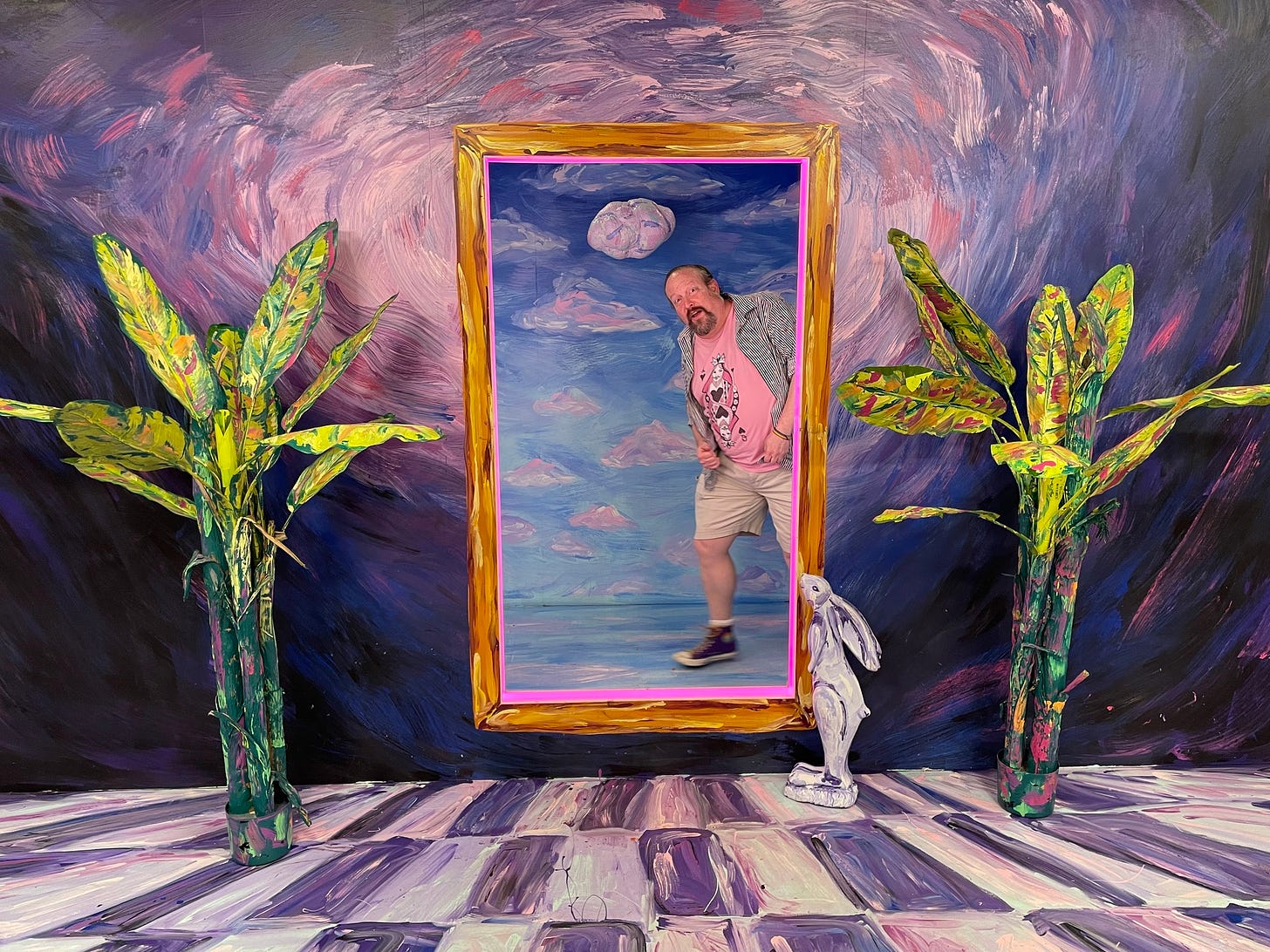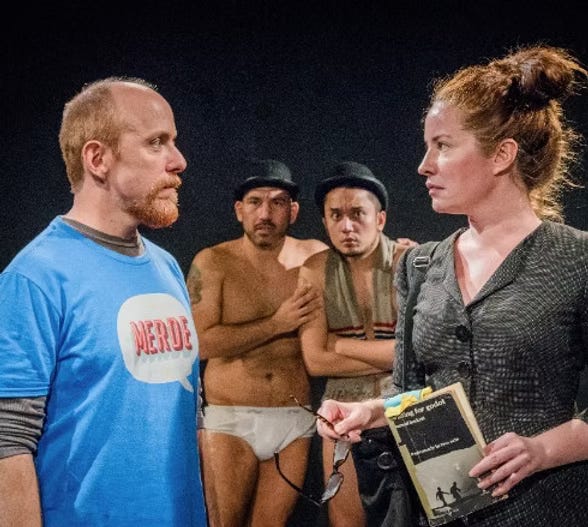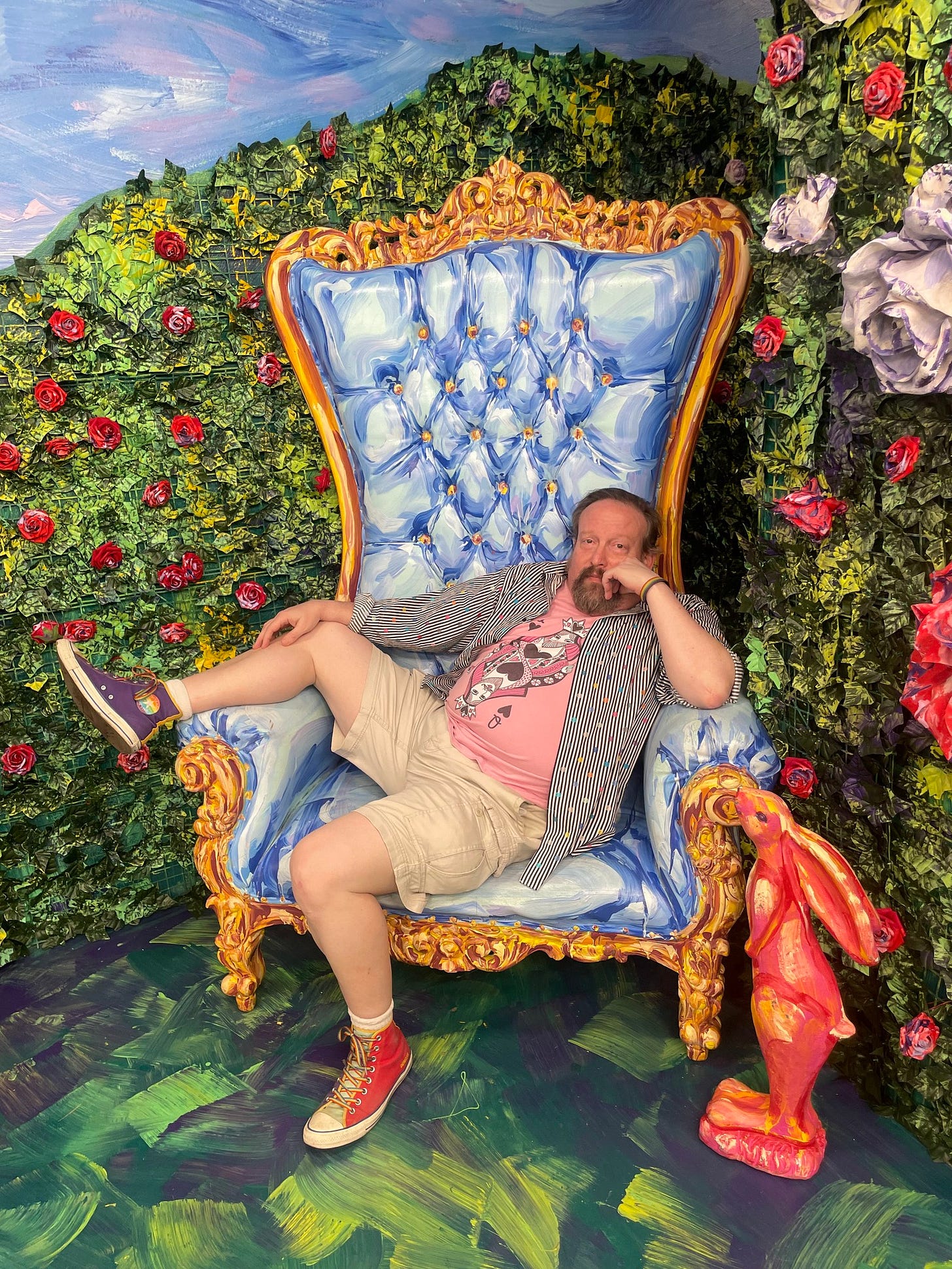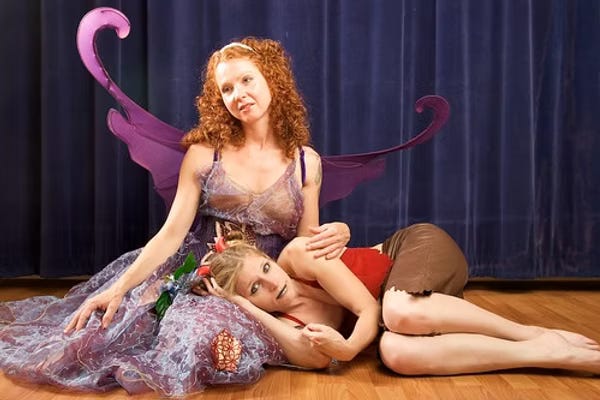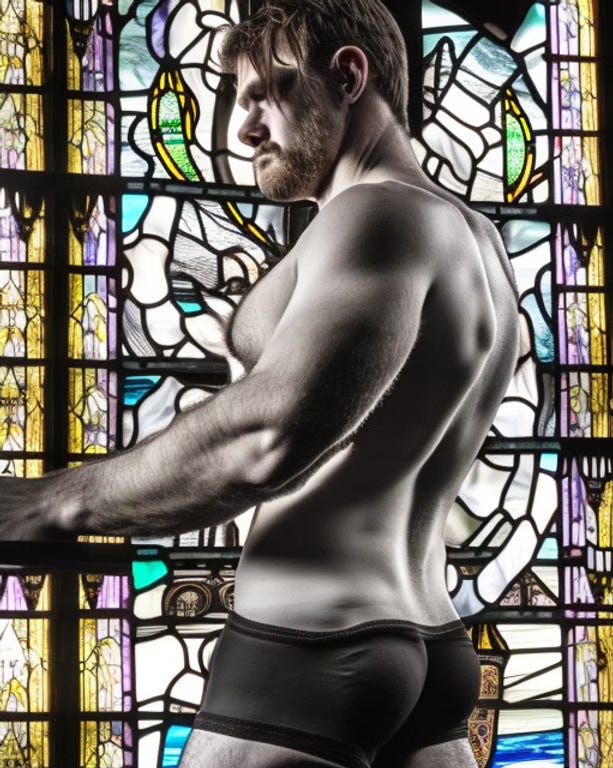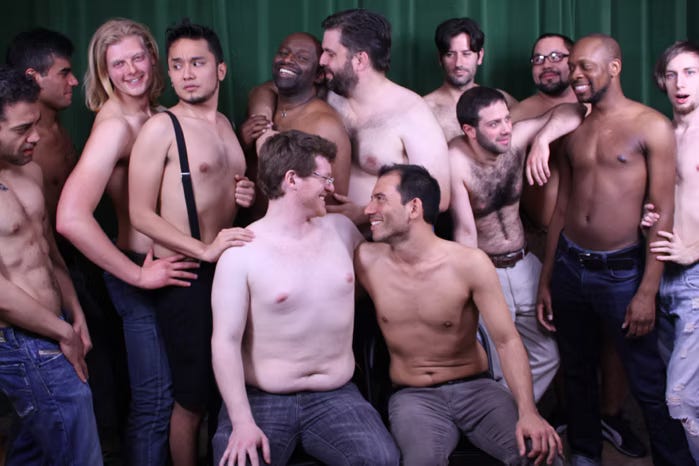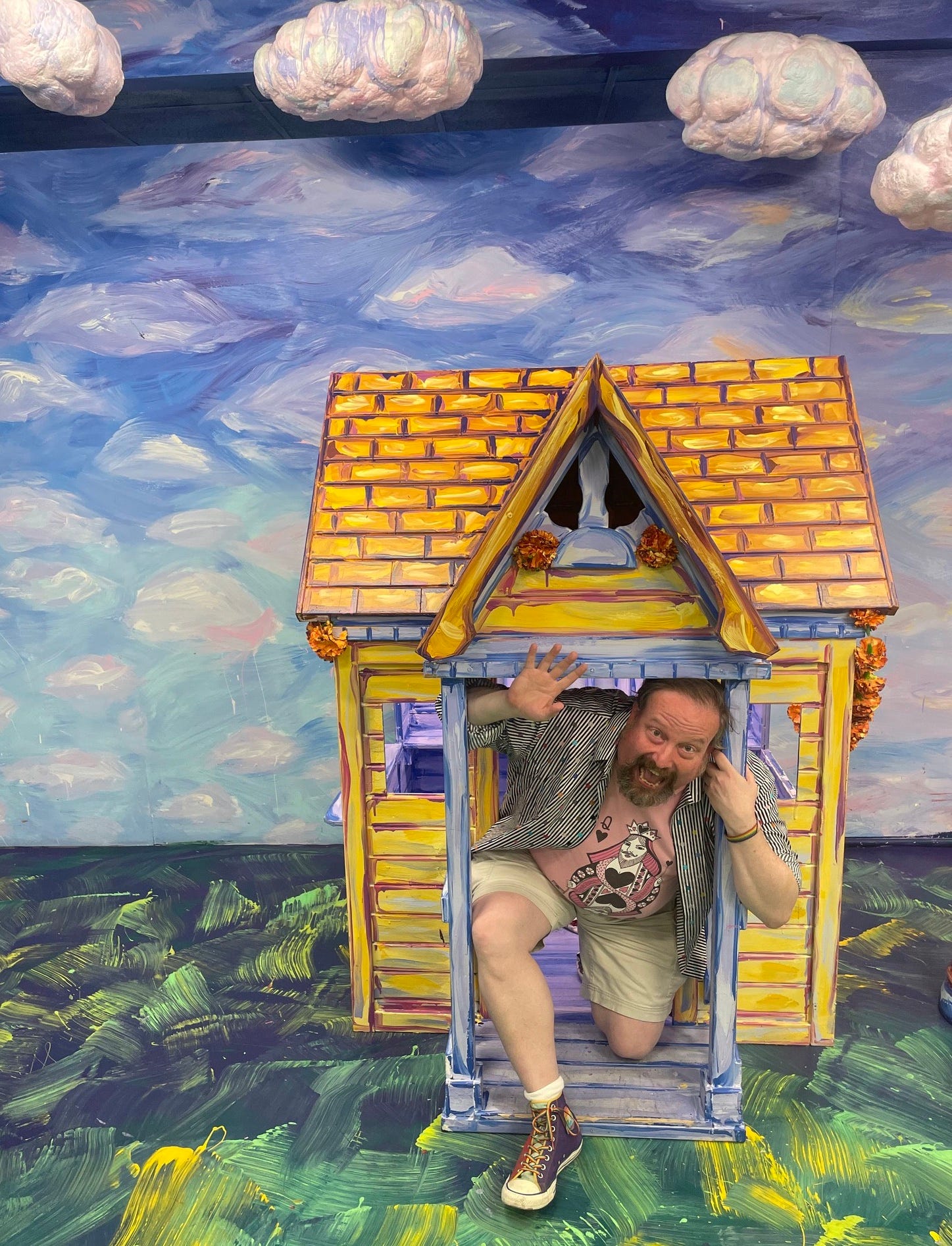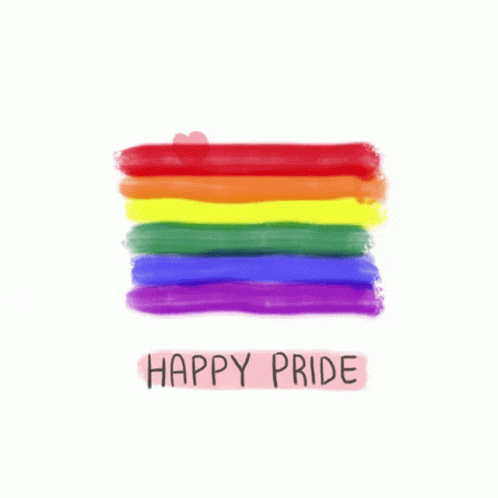"Art is Resistance"
Gay New York City playwright Duncan Pflaster talks making queer theater today.
Duncan Pflaster is an award-winning New York City playwright and actor, with dozens of plays to his name. Known for his queer absurdist point of view, Pflaster has carved out a unique niche for himself in the New York City theater community.
As New York celebrates Pride, I talked to Pflaster about playfulness as anti-fascist resistance, writing in verse, the importance of male nudity today, and a Godot full of underpants.
How did you first get interested in theater?
My mother was an actress when I was growing up. She spent a lot of time working at the Royal Palm Theatre in Boca Raton, so I l saw a whole bunch of plays there that she was in. And it’s just always been sort of the thing I wanted to do. And I was actor for a really long time.
Were you writing as well during that time?
Not realllly? I knew how plays worked and I’d sort of sketch out some stuff, but I didn’t expect it would ever be performed anywhere. But I was working at this place called Florida Playwrights’ Theatre in Hollywood, Florida as an actor. I was in pretty much every show they did for a while. And there was this bar around the corner called Sneakers where we would all go after every show and just drink and chat. And one guy was like, You know what would be funny is if we did Alice in Wonderland but with drag queens, and made it like Walk on the Wild Side. And I was like, I will write that play!
A year later I had Wilder and Wilder, which was the first play that I officially wrote. We did it as a late night show, then the main stage show got cancelled, so we ended up moving it to the main stage for a couple weeks until we could get up a new show. It was in like ‘95.
What was it like to see your own work on stage?
It was amazing, but I was also in it. The company was very much into Charles Busch and Charles Ludlam plays, and that kind of a wacky We’re doing a late night funny thing, and this was a big epic where everybody was changing costumes every five seconds to play other characters. I played an Andy Warhol caterpillar, a Jackie Curtis Queen of Hearts, and a couple other parts. The part with the Duchess and the Pig in Alice in Wonderland we did as an I Love Lucy episode, and I was Fred in that. It was a whole bunch of mashup of crazy queen drag queen stuff, Alice in Wonderland, and 70’s culture.
It’s amazing to me that your first play already has so much of what you do—it’s playful, it’s anarchic, it’s queer. And it has a great appreciation and awareness of other work.
I have trouble coming up with plots of my own. I recently read Tom Stoppard’s biography and he said pretty much the same thing, that it was “Thank God we finally have a plot.” So yeah, a lot of my work is either inspired by or riffing on other material.
One of my favorites of this kind is The Underpants Godot, in which you have a theater company rehearsing a production an underpants-only production of Waiting for Godot and the Beckett estate shuts it down. How did that play came about?
Cast of the 2015 Secret Theatre production of The Underpants Godot.
I’ve always been a fan of Godot. I saw the most recent revival with Patrick Stewart and Ian McKellen, which was incredible. And I was just sort of daydreaming at intermission, how would I take Waiting for Godot and make it sexier and weirder. I contemplated actually putting on a workshop production of guys in their underwear just taking the text and seeing what could be done. But I thought, Nobody would ever let me do that. What if I wrote a play about somebody doing that?
It’s wild because even though we’re only get moments of Godot per se, it still has that Godot sense of waiting and absurdity. And at the same time it’s a play about a lot of other things, like the state of theater today.
I love Waiting for Godot, I think it’s great, but a lot of it is kind of incomprehensible to modern audiences, because certain references were from decades ago.
Are there certain writers you look to as influences?
I think Tom Stoppard is a big influence on my work. Charles Ludlam and Charles Busch as well. They’re the big ones.
Also, Donald Margulies, who wrote Dinner with Friends, Sight Unseen, Collected Stories, a lot of really great stuff, he’s my favorite well-known contemporary playwright at this point.
What is it about Stoppard that has appealed to you?
I think with Stoppard it’s the playfulness of what you can do in the theater that you can’t do anyplace else. Like in Arcadia, having two scenes from two different era happening in the very same room, that kind of thing.
Do you know Aria da Capo by Edna St. Vincent Millay? It’s an anti-war one act play in verse from the 1940s? It starts out as a commedia dell’arte piece—two commedia dell’arte people are going Oh we’re having a feast la-di-dah, and then a Muse of Tragedy comes in and says It’s time for my play, calls in the actors from his play and says they have to do the tragedy now. They do the tragedy, they die, and then the commedia dell’arte people come back, shove the bodies under the table and keep doing the final circus play on top of it.
When I did it, I had the tragedy characters, who aren’t ready when the Muse shows up, in their street clothes—they came in hoodies, one guy brought in a cup of coffee from Dunkin’ Donuts which he put on the foot table. And then it was left there after they were shoved under.
Stoppard has a table in the middle of Arcadia where people keep leaving things, they are things from both the time periods happening at the same time, and you can just ignore them or have them be part of the thing.
I’m in awe of your productivity.
I am productive, but I also think that I’m a slacker.
In what way?
I don’t work as much as I could. I get writer’s block something awful. But people say I’m more prolific than they are. I’m constantly doing as much theater as I can.
Have you ever read any Discworld?
I’ve only read the first book.
Oh wow. They get better!
There’s one called Weird Sisters, which is his sort of a Shakespearean-inspired one, where there’s this traveling group of players, looked over by Whel, who is a dwarf and the writer of these things. And he keeps getting hit by inspiration and can’t stop. He finds it hard to write because he keeps coming up with new ideas, and I feel like that sometimes.
Like the next idea ends up killing the momentum on what you’re already doing?
Yeah.
Are there things that you find have always been preoccupations in your work?
Pocket Universe, a ten-minute play a scientist who creates a personalized universe for his office crush.
I mean, the gay stuff, a lot of my work is about gay and straight people cohabitating. But other than that, a sense of theatricality, wanting to do plays that can really only be done on a stage. I have written a couple of movies, but when you’re writing a movie, they can just do anything! They can go anywhere! On a stage, I find that Fourth Wall very comforting and helpful for me.
That’s interesting. Your imagination is so massive, it feels like movies could offer you so much opportunity.
It’s too much opportunity. Constriction, they say, is very good for imagination. It’s why I write in verse a lot as well.
Really?
I write in Iambic pentameter. I was recently interviewed on my friend’s podcast about writing verse drama which is called Hamlet to Hamilton, Emily C.A. Snyder. We talked for close to four hours about writing verse specifically for theater and what it means. Nobody teaches it, which is an interesting thing. She is developing in England right now a course on how to teach how to write verse as a dramatic construct, and what writing in verse means for an actor interpreting that.
Emily talks a lot about how the verse is sort of a map for the actor. If you write things in a certain way, if the line is I don’t know why I came here, and then you put four lines which is just blank text, and then continue the line, But I’m glad I came, that means something to the actor. Putting things in a shape makes things more interesting.
So verse might help the actor more than straight prose.
Yes, and putting things in iambic pentameter is more of a formal way of speaking. That’s good when you need some kind of dramatic statement.
In my Greek mythology play Nothing But Thunder [in which a young Dionysius goes with his slave Xanthias to try and rescue his mother Semele from Tarturus], anytime the chorus members came out they spoke in iambic sextameter—should be septameter, I know, but we lie to call it sextameter. The protagonist’s big monologue at the end also started out in iambic sextameter, and then at a certain point I start dropping an iamb every four lines, so it got shorter and shorter and shorter. That was intended to increase the intensity of the monologue as it went along.
How did you get started writing in verse?
I wrote a sequel to Midsummer Night's Dream called The Thyme of the Season. In that the fairies, Oberon and Titania speak in iambic pentameter, the lovers sometimes speak in iambic pentameter, the two little fairies Puck and Pumpkinseed speak in sort of a Dr. Seuss rhythm, and Bottom just speaks in prose. I think that was 2008.
Wow, it sounds like a huge challenge wedding those different rhythms.
And sometimes they rhyme and sometimes they don’t depending on the character and the situation.
Michelle Ramoni and Clara Barton Green in the 2010 production of The Thyme of the Season, co-conceived by Green, in which Titania and Oberon have to find a human soul they can sacrifice to Hell.
So much of your work is really playful and anarchic, but A Touch of Cinema, about a filmmaker under house arrest in a fascist state and trying to sneak a film out, is intensely dramatic.
I listen to this podcast called Linoleum Knife, which is run by two gay bears who are both film critics and are married to each other. They were talking about Jafar Panahi, an Iranian playwright who was taken by the government, placed under house arrest and not allowed to make films. He subsequently made a film and snuck it out of the country in a flash drive in a cake. He’s since gone on to make several other movies, sort of illegally, I just watched his most recent one, No Bears, which is on Criterion.
That was the inspiration. But I decided to fictionalize it and make it more universal.
It feels very of the moment.
It was written just after Trump got elected the first time. My friends at Lafayette did a reading of it a month or so ago and said, Yeah, people need to do this play right now.
That one’s published by Next Stage Press, and I’m hoping more people will do it.
Which others are published by Next Stage?
Harmony Hall and Fourteen Hundred and Sixty Sketches of Your Left Hand.
Poster for a 2023 production of Harmony Hall, about a monk who has lived in exile on an island monastery for 20 years. After a young man with memory loss washes ashore, he begins to question what exactly he’s committed to.
Would you describe your work in general as political?
Yes. Some more than others, but there’s generally some sort of social commentary in there. They’re anti-fascist, generally just trying to have people get along and understand each other, communicate.
Do you think that the style of your work, the Ludlamesque elements of some of your work, the playfulness is itself antifascist?
Oh absolutely. I wrote Prince Trevor Amongst the Elephants, my big naked epic Shakespearean fairy tale play, and it was specifically inspired by George Bush.
I find it interesting to think of playfulness as itself a form of resistance.
Art is resistance in a lot of ways.
Your ten-minute play at The Chain recently had two gay men and their drunk straight friend on his birthday. It’s a comedy about how these two gay men think about straight people, but there’s also that line in it about queering the straight spaces, that that’s really the mission statement of the gay characters.
It’s something that’s on the mind of those characters at the moment, but it’s a current concern.
The cast of the 2012 production of The Taint of Equality, or I Want Your Sex, a gay farce about what happens when a gay couple try opening up their relationship.
A lot of your plays have male nudity. Where does that come from?
Well first off I like to see naked guys. And it sells tickets.
But I think the heterosexual male gaze has been such a predominate thing that just having a naked guy on stage by itself is still an act of rebelling. I’ve written a lot of plays where guys get naked, and a couple where girls get naked, too, but mainly that. And gay sex is I think important, and the gay gaze is something to be valued.
I always find it confronting, despite being gay myself. It’s so not the norm, it’s shocking.
Yes, it still is.
It never feels extraneous to the story, either.
No, I have a reputation for always justifying the nudity in my plays.
I think that people in general don’t talk enough about sex, that it’s still something that they feel they have to be quiet and ashamed of, and so putting that on stage I think is important. Sex rules a lot of people’s emotions and what they do, and I think the more air and light we give it, the more people will be happier and can come out of the closet with whatever they’re doing.
You’d think in the modern era that we’re much more liberated, and yet even in a brief moment like in that 10-minute sketch, you see we’re not. It actively undermines the sense of comfort that a lot of theater relies on to draw you in. I always have the sense that you’re doing something more than aiming for a laugh. You’re playing with explosives.
I’m trying.
Are there artists you look to that are good at showing the queer gaze?
A lot of painters, I think. A lot of photographers. The people who did my movies and a couple of others—they’ve changed names several times, but they’re Scorpio Film Releasing—they are working on this thing called Pansyvision [now called Rainbow Film Club], which is a fake gay history of film, which I have one small piece in. They also did this horror film called Before the Night is Over, which takes place in this male brothel run by two women, and it’s a very spooky weird movie. There’s Pink Narcissus, the 1971 movie which also has Charles Ludlam in it.
Charles Ludlam was big about having people take their clothes off, as well, it was part of his aesthetic.
In terms of contemporary playwrights, who do you look to for great queer takes on the universe?
I’ve been following Cole Escola for decades on social media. They’ve just been doing incredible work. I saw them first in a tribute to Jackie Curtis called Jukebox Jackie—it was Cole Escola, Mx. Justin Vivian Bond, Bridget Everett, and a man, and the four of them represented different aspects of Jackie Curtis. It was a really fascinating piece. Cole came out and did this song that was just hilarious.
They’ve done some amazing movies, short films. They do a Bernadette Peters impersonation, Bernadette Peters getting her taxes done. “What’s your social security number?” “Nine.” “Just nine? Okay?” It’s so good, so funny.
He may be cancelled now, but I think the lead in The English Teacher, Brian Jordan Alvarez, has done a lot of incredible work in promoting gay stuff. And Stephanie Koenig, who’s in that with him, too, wrote and directed A Spy Movie, in which he plays two roles, one of them in drag as a secret agent. It’s just hilarious. They seem to have a nice group of people all together in Los Angeles who are working on funny shit together.
Do you have a white whale, in terms of a topic or a story you want to tell but you haven’t felt ready to do yet?
I have a few plays I’m working on that I’m kind of scared to tackle. One of them is about pedophile vigilantes, and a couple of other things.
What is about those stories scare you?
Just delving into those emotions.
I don’t write a lot of sad plays. All of my plays have some kind of comedy in them, because I’m just sort of naturally funny. I wrote this play called The Tragedy of Dandelion, which was also written entirely in iambic pentameter, and was written for a cast of all female people to play a multitude of genders. But it’s called The Tragedy of Dandelion, I have a jester who’s there to make the jokes. It’s good stuff. And it is sad at the end, there are moments. But I don’t lean into the sad stuff.
We just started rehearsing Bartleby the Barista, which is an adaptation of the Melville’s Barlteby, the Scrivener, and the actor who was reading it sort of got choked up at the end, and I thought, Oh right, this is a sad moment! Oh yeah! I like the actors to have the sad moments that are there, but I try not to lean too much into that. I think that’s probably the thing I shy away from the most.
Do you find writing short plays, like the 10-minute plays you’ve done for The Chain, require a very different skill?
Absolutely. And a lot of people don’t seem to be able to do it all that well.
What that’s the key to making those kinds of plays work, for you?
I think of it like, An atom is one part of a larger thing, but it still contains everything that’s in the larger thing. So trying to suggest as much as you can a larger world out there. But trying to keep to major storytelling beats, start with an opening, move on to development and a big finale or twist, and you’re done. It’s like telling a joke in a lot of ways, you’re setting up setting up setting up and then the punchline! And we’re done. Even if it’s not a funny piece, that’s still the way it works. You’re telling a short story.
I do this thing pretty much monthly called Living Radio where they give us writing conditions on a Wednesday and we have to pick a news story from that day or later to write a 10-minute-or-shorter play. We rehearse on Saturday or Sunday and we put the show up Monday.
Listen to Pflaster’s most recent Living Radio show: Enough with the Pride Already! Geez Louise!, about a jingle writer hired by the gay community to rebrand “pride” in the face of the corporate takeover of the term.
It’s like I was saying, I have trouble coming up with ideas, but if somebody says Hey, write something about this, and you have to do these things in it, that kind of restriction really helps aim me at something.
Are there other things that tend to inspire your work?
If I get pissed off about something, that tends to be a good inspiration.
Some of my plays were also written because I was dissatisfied with another piece of work. My play The Empress of Sex I wrote because I had seen the musical adaptation of Triumph of Love, which is not very good. But it spurred the idea in me of writing a story of someone who was sheltered from the world but decided instead of retreating into a monastic life and only read books decided to only have sex and avoid love entirely.
That was also inspired by Gilbert & Sullivan’s Princess Ida, which has a theme of men swearing off love and going to study books. There was a third inspiration, too, and the three of them all coalesced in my mind. I thought, I’m going to make something that works with this theme, but differently.
My play The Douchegirl Play (Better Name Pending)—which is now the full title—was inspired by douchebags in Adam Rapp, David Mamet, Neil LaBute plays, and how they’re always men and the women are getting fucked over. And I decided to do a gender flipped where the women are the assholes. And it was a lot of fun.
When you look at the world of theater today, what do you see?
Since the pandemic a lot of theaters are just doing safer work.
To get more people in the doors, do you think?
Yeah. And to not spend too much on something that might not be long lived. I think that’s probably affecting films as well, but you don’t have to do a film every night.
I love musical theater but there’s not a lot recently that I really want to see.
What kind of musical theater do you tend to like?
Stuff with a point of view, I think. I saw Death Becomes Her, which was very fun, but not really very deep. It seemed like something that it is easy to sell. And I bought into it, it was really fun. I had a good time. But yeah, it’s tough out there. There’s so many jukebox musicals and revisals.
I loved Head Over Heels a while ago, which was the GoGos jukebox musical. It was this amazing story written based on ancient texts of the 14th century but updated with a modern gender bending twist. Bonnie Mulligan, that was her first Broadway thing, she was nominated for a Tony. And it was this beautiful epic 14th century thing, gigantic costumes and a story about music curing everything. Just lovely stuff… annnnd then we would stop and do a song by the GoGos, which didn’t have to do much with the plot, but they shoe-horned them in there.
But it was such an amazing, beautiful, epic play probably wouldn’t get done if it wasn’t linked to a jukebox musical.
Would you say your writing has expanded or changed how you think about queerness?
I mean, I guess? I’m sort of trying to expand how other people think about queerness with my work. I was raised by a lesbian, my parents got divorced when I was ten. So I know the history, I’ve done the research, I know a lot of stuff that didn’t get taught in schools. I’ve just been soaking in it for all my life, and I feel like I have a perspective on the world that is important to why I write.
I think I’m the only one that’s going to write the plays I’m going to write. And I feel a duty to do that, and to show the world what I’m thinking. There’s a quote from the great Tom Robbins, that—I’m paraphrasing—being an artist is just having an idea and you show it to people so you can let them know this is what it is.
Thanks to Duncan for taking the time during Pride to talk about his work! (And by the way, the Alice in Wonderlandesque-photos of Duncan are courtesy of Erin Soler.)
Coming next week: Legendary lighting designer Jules Fisher on lighting the new production of Gypsy!
Happy Pride, everybody!




